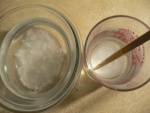Difference between revisions of "Conversion of Sodium Bicarbonate into Sodium Carbonate"
From DMT-Nexus Wiki
m |
(edited to avoid confusion) |
||
| Line 9: | Line 9: | ||
# Place in the oven at 400ºF (205ºC) for one hour to release CO2. | # Place in the oven at 400ºF (205ºC) for one hour to release CO2. | ||
# The resulting material should be of a slightly less powdery consistency, closer to sugar than flour. | # The resulting material should be of a slightly less powdery consistency, closer to sugar than flour. | ||
| − | #* '' | + | #* ''sodium carbonate feels a bit looser and grainier than bicarbonate, and in an oversaturated solution, sodium bicarbonate will remain powdery while sodium carbonate tends to rock up.'' |
{{ShowInfo/In Article|[[Image:Information.png]]|'''NOTE'''|This can also be done on a stove top/oven ring in a pot and take around 5-10 minutes to completely dehydrate (it becomes a fine light white powder and the CO2 stops bubbling through the powder). | {{ShowInfo/In Article|[[Image:Information.png]]|'''NOTE'''|This can also be done on a stove top/oven ring in a pot and take around 5-10 minutes to completely dehydrate (it becomes a fine light white powder and the CO2 stops bubbling through the powder). | ||
|0px | |0px | ||
Revision as of 18:28, 13 April 2010
| Note: | This page has been transcluded to The Nexian DMT Handbook under the Conversion of Sodium Bicarbonate into Sodium Carbonate section or other locations within or without the handbook. Please markup in consideration of this. The top section header is to remain in place as a reference for subsequent section headers and to allow easy editing directly from the handbook. |
